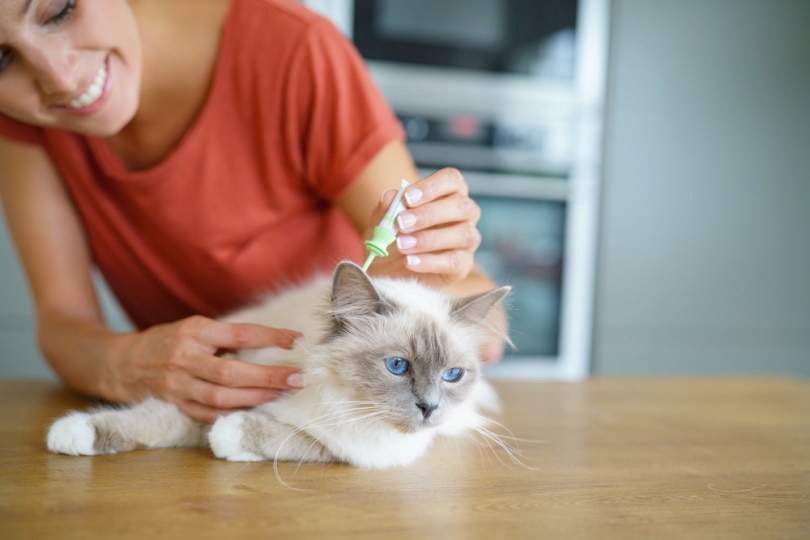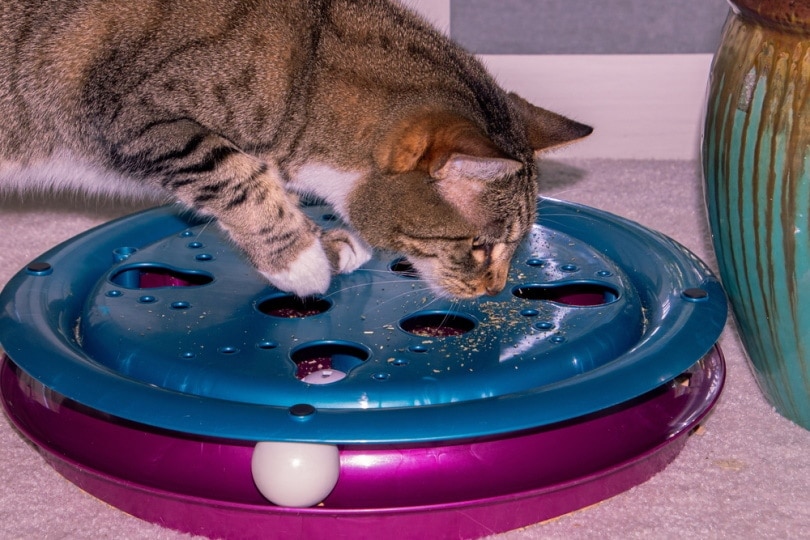Why Is My Cat’s Nose Dry? 6 Vet-Reviewed Reasons
Updated on
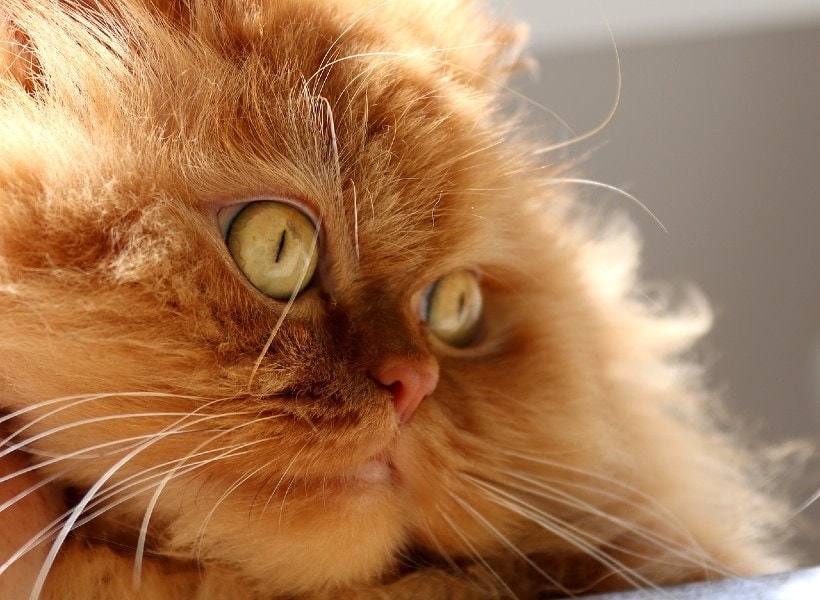
Our cats can’t simply tell us when they are sick. In fact, cats tend to hide any signs of their illnesses, so it is often challenging to determine when they are sick. Usually, you don’t notice that your feline is sick until they are really sick.
For this reason, we highly recommend that you keep a close eye on your cat. There are several signs that you may want to pay attention to, such as a dry nose.
While a dry nose doesn’t necessarily mean that your cat is sick, it can. Let’s take a look at all the reasons your cat may have a dry nose so that you can determine the underlying reason.
Why Is My Cat’s Nose Dry? The 6 Possible Reasons
1. Your Cat Is Dehydrated
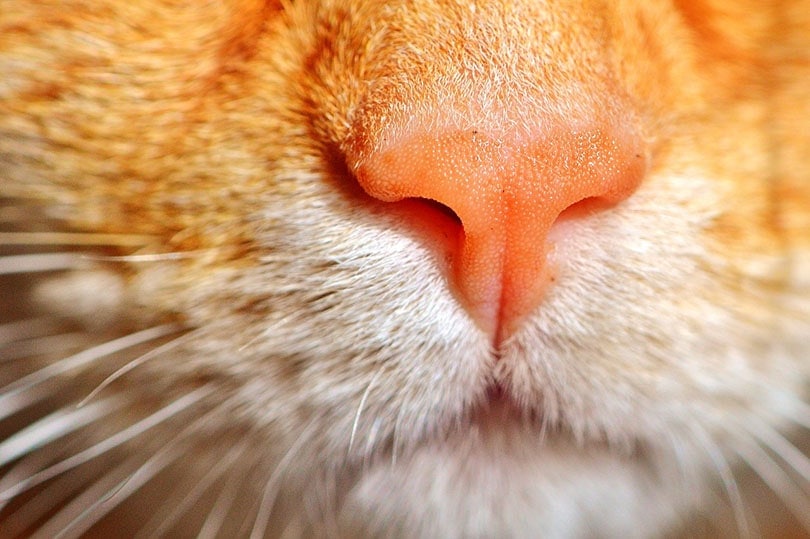
If your feline is dehydrated, then their nose may not be wet like it usually is. However, based on just a dry nose, it may be impossible to establish if your cat is dehydrated or not. There are other ways your vet can ascertain this, such as checking their mucous membrane moisture, skin tenting, clinical examination parameters, and blood tests. Sick cats can absolutely become dehydrated. If your cat isn’t eating as they usually do (or if they are vomiting or having diarrhea), then they can become dehydrated. Cats with fevers may also have a harder time staying hydrated, as they will not feel like eating and drinking.
However, some cats also simply don’t drink enough. Cats evolved to get at least some of their moisture from the food they eat. Therefore, if your cat is only eating dry food, then wet food may need to be added to their diet. Many felines will not drink enough without this added moisture. Still, healthy adult animals should be able to keep themselves well hydrated despite their dietary choice. Make sure they have plenty of fresh water always available. Using a water fountain and placing several water bowls around the house may encourage them to drink more.
If your cat suddenly becomes dehydrated, it’s a sign of an underlying health issue and you will need to contact your vet urgently. There are several illnesses that quickly lead to dehydration. Therefore, your vet will examine your cat and identify the problem so they can get the treatment they require.
2. It’s Normal for Them
Some cats simply have a dry nose more often than others. If you have a kitten with a dry nose or a new cat, it may just be how their nose is. Some of these cats don’t typically have anything wrong with them. For one reason or another, they simply don’t have a wet nose like other cats, or their nose is less wet than you expect.
Felines don’t have to have a wet nose. It is a little bit of a myth that their nose moisture level is related directly to their health. Some cats will always have a wet nose, while others will not. For this reason, you’ll need to be aware of your cat’s normal and carefully observe and familiarize yourself with their usual appetite, drinking, urination, defecation, and behavioral habits.
A dry nose isn’t necessarily a sign that your cat is sick. Instead, any change from their normal may be worrisome. A change in the indoor and outdoor environment, temperature, and humidity will also impact the level of your cat’s nose wetness. Some cat breeds or individual cats may have a predisposition toward a dry nose depending on their coat length and type, or may leave the impression of a dry nose due to their general wrinkled skin appearance, which is the case in hairless Sphynx breed.
3. Your Cat May Regularly Lick Their Nose
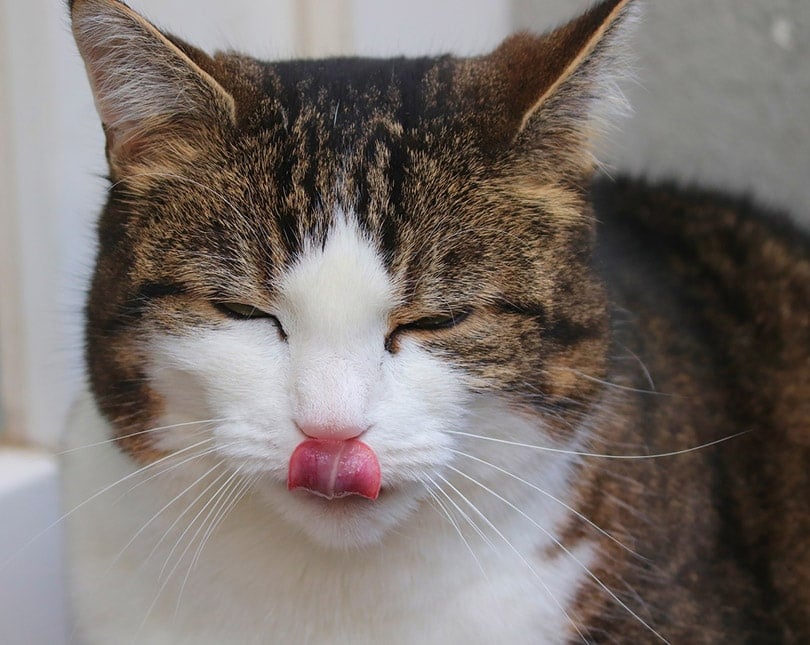
Cats that lick their nose may remove some of the moisture from their nose and may make them seem a little bit drier than usual. This isn’t necessarily a bad thing. However, it may make your cat’s nose seem dry at random points. For this reason, you may notice that your cat’s nose is dry and then get worried.
However, there is typically nothing to worry about if your cat’s nose is dry for this reason. With that said, you do have to be somewhat worried if your cat continuously licks their nose, lips, or anywhere else on their bodies. This may indicate an oral or dental issue, pain, anxiety, excessive itchiness, or irritation. Sometimes cats lick their noses more frequently if they have a nasal discharge, particularly after sneezing. If you notice anything like this, then you will need to visit the vet and get them checked out.
4. Your Cat Is Somewhere Warm
If you notice that your cat’s nose is dry, consider the temperature and humidity. If your cat was just outside in the heat, it is possible that the heat caused the moisture on their nose to evaporate. This is normal. Cats don’t sweat all over their body like us. However, they do sweat through glands located on their paw pads, lips, and chin, while their ears may also play a small role in thermoregulation.
Usually, having a dry nose in a hot and humid climate isn’t anything to be worried about, as long as your cat is sufficiently hydrated. However, you may want to ensure that your cat is drinking enough water to replace the water that they lost.
5. Your Cat Has a Health Issue
Besides fever and dehydration, there are other health issues that may cause your cat’s nose to suddenly become dry, alongside other signs of illness. Some of them may include scabs, scales, various crusts, ulcers, plaques, and other changes of the nasal mucosa due to, viral, bacterial, or fungal infections, as well as autoimmune disorders or trauma.
When a cat develops an upper respiratory infection, there is usually a nasal and even ocular discharge. This makes the nose wet to start with, but if the discharge dries up and blocks off the nostrils, it may cause the nose to appear dry and the cat to sound congested.
If your cat is sneezing, has any discharge from the nose or eyes, or is coughing, retching, eating less, or has a dry, stuffy nose, they need to be checked out by your vet. A blocked up nose makes it hard for cats to breathe properly, and this can become an emergency. It also puts them off their food, as they can’t smell it as well. Your vet will show you how to keep their nose clean, while the treatment for the underlying cause of your illness will help to resolve the signs.
6. Your Cat Has a Sunburn
If your cat loves sunbathing or spends a lot of time outside in the hot weather, especially if they’re light colored, there is a risk of them getting sunburn. This occurs on hairless areas of the body exposed to the sun, and the nose and ears are commonly affected. Signs of a sunburned nose may include swelling, redness, pain, scabbing, scales, and other uncomfortable changes. This will require veterinary treatment.
It’s important to protect your cat from the sun during the worst part of the day and to apply a protective cat-appropriate and vet-approved sunscreen.
Is a Cat’s Nose Supposed to Be Wet or Dry?
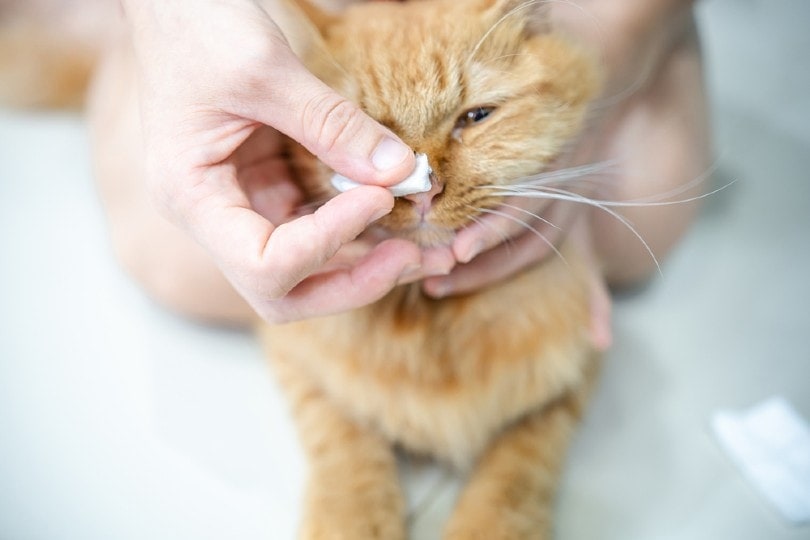
A cat’s nose can be either wet or dry. It varies a lot due to mostly harmless reasons. For instance, some cats simply have noses that are wetter than others. Furthermore, the environment, temperature, humidity, exposure to the sun, or health issues may affect your cat’s nose as well.
If it is very hot, your cat may have a dry nose. One of the worrying circumstances is if your feline is dehydrated. In these cases, your cat will need to see the vet urgently, as they are likely dehydrated because of an underlying illness.
Either way, you will need to speak to your vet if you notice your cat’s nose is dry along with other signs. However, a cat’s nose being dry by itself is usually not a cause for concern.
Conclusion
While a cat’s nose being dry can signal illness in some situations, this isn’t always the case. There are many situations where a cat’s nose being dry isn’t a problem. Sometimes a cat’s nose is simply dryer than average some of the time, depending on the outside temperature and humidity.
Other times, a cat may have a dry nose because they are dehydrated. Sometimes, this is caused by an illness. However, you’ll likely notice other signs of your cat not being well if that is the case. Speak to your vet if you believe there is a reason for your cat’s sudden nose dryness or if they are not quite themselves.
See also:
- How to Clean a Cat’s Nose: Vet-Approved Steps
- Reasons Why Your Cat’s Nose Is Changing Color (Explained!)
Featured Image Credit: birgl, Pixabay




